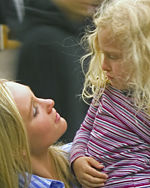Mother

A mother is a biological and/or social female parent of an offspring. Because of the complexity and differences of the social, cultural, and religious definitions and roles, it is challenging to define a mother in a universally accepted definition.
Contents |
Biological
In the case of a mammal such as a human, the biological mother gestates a fertilized ovum, which is called first an embryo, and then a fetus. This gestation occurs in the mother's uterus from conception until the fetus is sufficiently developed to be born. The mother then goes into labor and gives birth. Once the child is born, the mother produces milk in a process called lactation to feed the child; often the mother's breast milk is the child's sole nourishment for the first year or more of the child's life.
Title
The title mother is often given to a woman other than the biological parent, if it is she who fulfills the social role. This is most commonly either an adoptive mother or a stepmother (the biologically unrelated wife of a child's father). Also, in both African-American and lesbian cultures non-biological othermothers exist. Currently, with advances in reproductive technologies, the function of biological motherhood can be split between the genetic mother (who provides the ovum) and the gestational mother (who carries the pregnancy), and in theory neither might be the social mother (the one who brings up the child). A healthy connection between a mother and a child form a secure base, from which the child may later venture forth into the world.[1]
Social Role and Experience
Social Role

- See also: Sociology of motherhood
Mothers have historically fulfilled the primary role in the raising of children, but since the late 20th century, the role of the father in child care has been given greater prominence in most Western countries.[2][3]
Experience

The experience of motherhood varies greatly depending upon location. The organization Save the Children has ranked the countries of the world, and found that Scandinavian countries are the best places to be a mother, whereas countries in sub-Saharan Africa are the worst.[4] A mother in the bottom 10 countries is over 750 times more likely to die in pregnancy or childbirth, compared to a mother in the top 10 countries, and a mother in the bottom 10 countries is 28 times more likely to see her child die before reaching his or her first birthday.
Religious
Most of the major world religions define tasks or roles for mothers through either religious law or through the deification or glorification of mothers who served in substantial religious events. There are many examples of religious law relating to mothers and women. Some major world religions which have specific religious law or scriptural canon regarding mothers include Christians[5], Jews[6], and Muslims[7]. Some examples of glorification or deification include Mary for Christians, the Hindu Mother Goddess, or Demeter of ancient Greek belief.
Synonyms and translations
The proverbial "first word" of an infant often sounds like "ma" or "mama". This strong association of that sound with "mother" has persisted in nearly every language on earth, countering the natural localization of language.
Familiar or colloquial terms for mother in English are:
- mom or mommy, in most of North America (especially the U.S.). It is used widely in the West Midlands, in the UK.
- mum or mummy, is used in the UK, Netherlands, Australia, and New Zealand
- Ma, Mam or Mammy is used in Ireland and sometimes in the UK and the US.
- Maa, Amaa, Maataa is used in India and sometimes in neighboring countries
- "mama" is used in many countries, but is considered a Spanish form of "mother"
In many other languages, similar pronunciations apply:
- mama in Polish and Slovak
- māma in Mandarin Chinese
- máma in Czech
- maman in French and Persian
- mamma in Italian
- mãe in Portuguese
- Ami in Punjabi
- mama in Swahili
- eema (אמא) in Hebrew
- umma (엄마) in Korean
- Mama, borrowed from the English, is in common use in Japan.
- In many south Asian cultures and the Middle East the mother is known as amma or oma or ammi or "ummi", or variations thereof. Many times these terms denote affection or a maternal role in a child's life.
Famous and/or Legendary mothers
- Mary
- Bithiah
- Gaia
- Hagar
- Isis
- Jocasta, mother of Oedipus, important in Freudian psychology
- Juno
- Queen Maya
- Euripides' Medea
- Venus
- Parvati
- Demeter
See also
- Mary
- Attachment parenting
- Breastfeeding
- Human bonding
- Jungian archetypes
- Lactation
- Matriarch
- Matricide
- Mother Goose
- Matrilocality
- Mother insult
- Mother's Day
- Mothers rights
- Nuclear family
- Oedipus complex
- Parenting
- Mother ship
- Mother goddess
- Mother Superior or Abbess
- Othermother
Notes
- ↑ Diane S. Feinberg, M.Ed. The Importance of Mother and Child Attachment
- ↑ "In most Western countries the family model of a sole male breadwinner is in full retreat." Accessed 19 September 2007.
- ↑ Why Are Fathers Important? Interview with Dr. Ross Parke, professor of psychology at the University of California at Riverside, author of Fatherhood (1966) and co-author of Throwaway Dads (1999). Accessed 19 September 2007.
- ↑ Save the Children, State of the World's Mothers Report 2006.
- ↑ "What The Bible Says About Mother". Retrieved on 2008-11-24.
- ↑ Katz, Lisa. "Religious Obligations of Jewish women". About.com. Retrieved on 2008-11-24.
- ↑ ‘Ali Al-Hashimi, Muhammad. The Ideal Muslimah: The True Islâmic Personality of the Muslim Woman as Defined in the Qur’ân and Sunnah. http://www.wefound.org/texts/Ideal_Muslims_files/herchildren.htm. Retrieved on 2008-11-24.
|
|||||
|
|||||||||||||||||||||||||||||||||||||